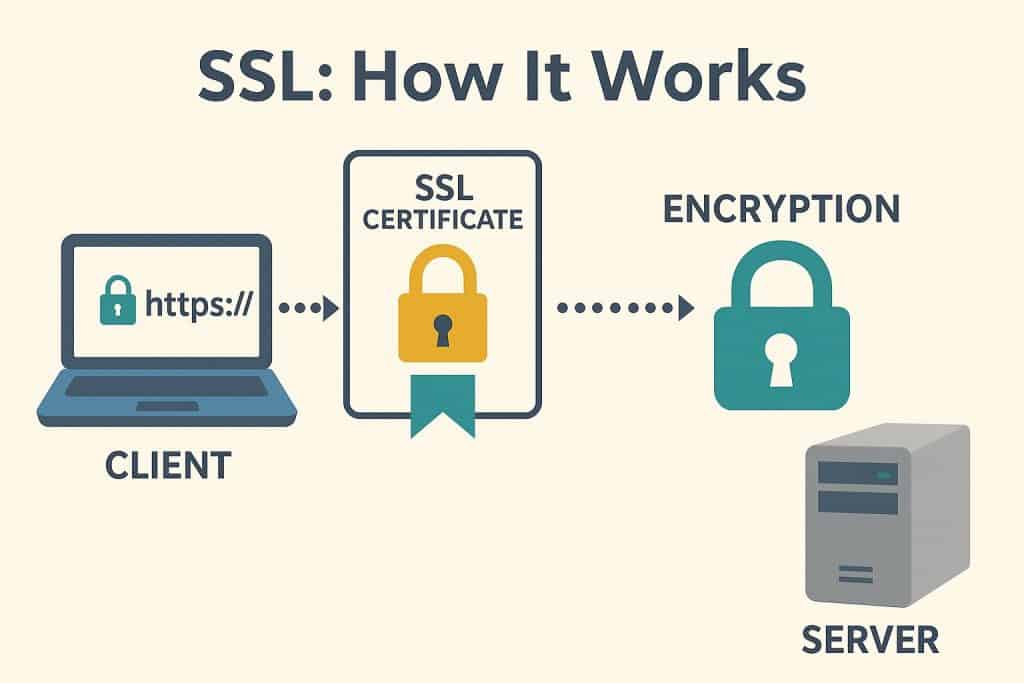In today’s digital landscape, websites must stay secure. Therefore, using SSL is no longer optional; it’s essential. Google encourages all websites to adopt HTTPS for a safer web. One of the first decisions site owners face is choosing between free SSL vs paid SSL certificates. While both options secure your website with HTTPS, they differ greatly in terms of trust, features, and long-term reliability. This guide breaks down the differences to help you decide which SSL certificate is best for your business or personal site.
What is an SSL Certificate and Why It Matters?

SSL (Secure Sockets Layer) is a standard security protocol that establishes an encrypted connection between a web server and a browser. This encryption ensures that all data transmitted between the server and the browser remains confidential and integral, protecting it from interception or tampering by malicious third parties.
SSL is crucial for websites due to several reasons:
- Encryption: SSL encrypts data, preventing unauthorized access and safeguarding sensitive information such as login credentials, financial transactions, and personal details.
- Trust and Credibility: Websites secured with SSL certificates display visual cues such as a padlock icon and “HTTPS” prefix in the URL, instilling trust and confidence in visitors.
- Regulatory Compliance: SSL encryption is often required to comply with industry regulations and standards related to data protection and privacy.
- Search Engine Ranking: Major search engines like Google prioritize HTTPS-enabled websites in their search rankings, providing better visibility and credibility.
Forms of SSL Certificates
SSL certificates are of two forms: Free SSL Certificates and Paid SSL Certificates.
As the name implies, Free SSL certificates are available free of cost, and they do not come with any support or warranty. Free SSL certificates are of two types. The first one is self-signed certificates, which are not signed by any certificate authority. The other one is signed by a certificate authority.
Paid SSL certificates are available on payment and signed by a trustworthy certificate authority (CA). They can be purchased directly from the Certificate Authority’s website or from any retailers like Veeble.
Free SSL vs Paid SSL – Key Differences Explained
Even though free SSL and paid SSL possess diverse features, the level of encryption provided by both certificates is equal. Let’s take a look at the differences between free SSL and paid SSL.
Validation Options:
Free SSL offers a Domain Validation (DV) option in which only one domain can be secured. This provides only a basic level of authentication by authenticating only the domain’s ownership, and no effort is made to verify who the domain owner is.
Paid SSL mandatorily verifies the identity of the website owner before issuing the certificate. It additionally includes Extended Validation (EV) and Organization Validation (OV) certificates, which are issued by the certificate authority after a thorough verification of the business.
Validation Period:
Validation for a Free SSL certificate typically lasts only 30 to 90 days, requiring frequent renewals to maintain website security. In contrast, a Paid SSL certificate is valid for 1 to 2 years, offering long-term protection without the hassle of constant renewal. This extended validation period allows your online business to remain secure and reliable over time, while giving website owners greater peace of mind.
Customer Certainty
Free SSL lacks customer trust as it is not issued by a reputable certificate authority. Search engines indicate the websites that have adopted OV and EV certificates by displaying “https” letters in the URL in green color. This visually reassures the visitors that their connection to the particular website is trusted and their confidential information will be kept secure.
Guaranteed Customer Support
Paid SSLs issued by Certified Authorities (CA) and retailers like veeble guarantee round-the-clock prompt customer support via email or call or chat. Free SSLs cannot afford to offer such prompt support, and the website owners have to surf the web to find an optimal solution for an issue.
Warranty Claims
If anything goes wrong on your website, such as a data breach or hacks, when equipped with Free SSL, there is no option to avail damage coverage. This is not the case with Paid SSLs where you get insurance coverage for the incurred loss. The coverage amount depends on the price of your SSL. High-Paid SSLs are likely to get an ample warranty.
| Feature | Free SSL | Paid SSL |
|---|---|---|
| Validation | Domain-only | DV, OV, EV |
| Renewal | 30–90 days | 1–2 years |
| Support | No support | 24/7 support |
| Trust | Lower | Higher (Green padlock, warranty) |
How To Choose The Right SSL For Your Business?
When selecting the appropriate SSL for your business, it’s crucial to consider your website’s specific needs and security requirements. At Veeble, we offer a wide range of SSL options tailored to suit various business scenarios. For instance, if you operate a business website or an e-commerce platform that handles sensitive customer data such as account numbers and passwords, opting for one of our Paid SSL certificates is highly recommended. Unlike free SSLs, these Paid SSLs offer enhanced validation, warranty coverage, and advanced security features. As a result, they help establish greater trust with your visitors and boost your site’s credibility. Consequently, this trust often translates into higher conversion rates and stronger brand loyalty.
🔐 Upgrade to Paid SSL for Ultimate Protection
Boost your website’s trust, SEO, and customer confidence with a premium SSL certificate—complete with full validation and 24/7 support.
👉 Get Secure Now
While investing in Paid SSLs may require an upfront cost, the long-term benefits far outweigh the initial investment. With Veeble’s Paid SSL options, you can ensure the security and integrity of your online transactions, ultimately contributing to the success and growth of your business.
